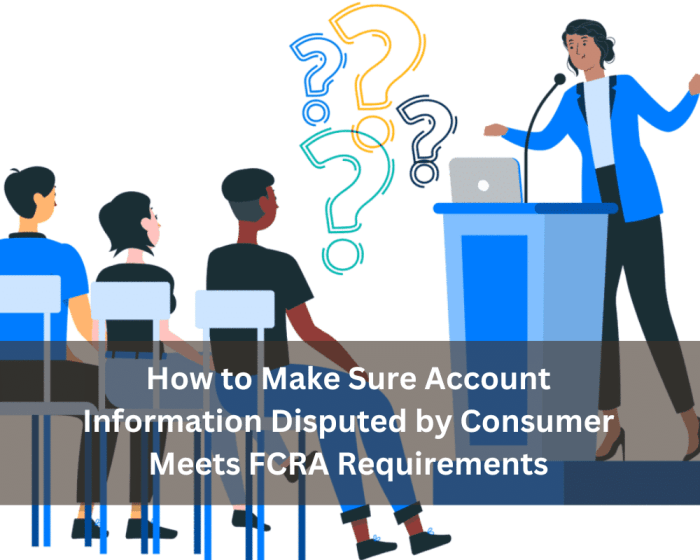Account information disputed by consumer meets FCRA requirements meaning introduces a topic of paramount importance in the realm of consumer credit. The Fair Credit Reporting Act (FCRA) establishes a legal framework to safeguard the accuracy and fairness of consumer credit reports, empowering individuals to challenge disputed account information.
This comprehensive guide delves into the intricacies of the FCRA’s provisions, exploring the definition of disputed account information, the requirements for a valid dispute, and the consequences of disputing an account.
As we navigate the complexities of the FCRA, we will uncover the time limits for filing a dispute, the necessary information to include, and effective strategies for filing a dispute. Furthermore, we will examine the exceptions to the dispute process, the impact on credit reports and scores, and the procedures for investigating and resolving disputed accounts.
Throughout this journey, we will emphasize the importance of monitoring credit reports regularly and provide valuable tips for protecting credit information.
FCRA Definition of Account Information Disputed by Consumer

The Fair Credit Reporting Act (FCRA) defines “account information disputed by consumer” as any information in a consumer’s credit report that the consumer believes is inaccurate or incomplete.
Disputes can arise when a consumer identifies errors or inconsistencies in their credit report, such as incorrect account balances, unauthorized accounts, or incorrect payment histories.
Requirements for a Valid Dispute
To file a valid dispute under the FCRA, the consumer must:
- Provide specific details about the disputed information, including the account number, creditor name, and specific error.
- Submit the dispute in writing to the credit reporting agency.
- Include supporting documentation, such as account statements or proof of identity.
- File the dispute within 60 days of receiving the credit report containing the disputed information.
Consequences of a Disputed Account
When an account is disputed, the credit reporting agency must investigate the dispute and notify the consumer of the results within 30 days.
If the investigation confirms the dispute, the credit reporting agency must correct or delete the disputed information from the consumer’s credit report.
If the investigation does not confirm the dispute, the credit reporting agency may continue to report the disputed information, but must include a statement that the consumer disputes the information.
Exceptions to the Dispute Process
There are exceptions to the dispute process under the FCRA, including:
- Information that is reported accurately and has not been altered by the consumer.
- Information that is based on a court order or judgment.
- Information that is necessary to identify or prevent fraud.
Additional Considerations, Account information disputed by consumer meets fcra requirements meaning
Consumers should regularly monitor their credit reports to identify any potential errors or disputes.
Consumers can also request a free copy of their credit report from each of the three major credit reporting agencies once per year.
If a consumer has difficulty resolving a dispute with a credit reporting agency, they can contact the Consumer Financial Protection Bureau (CFPB) for assistance.
FAQ Corner: Account Information Disputed By Consumer Meets Fcra Requirements Meaning
What constitutes a valid dispute under the FCRA?
A valid dispute under the FCRA requires the consumer to provide specific information, including the disputed information, the basis for the dispute, and supporting documentation if available. The dispute must be filed within a reasonable time frame, typically 30 days from receiving the credit report.
What are the consequences of disputing an account?
Disputing an account can temporarily lower your credit score, but it also triggers an investigation by the credit reporting agency. If the dispute is found to be valid, the inaccurate information will be corrected or removed from your credit report.
What are the exceptions to the dispute process under the FCRA?
The FCRA provides certain exceptions to the dispute process, such as when the disputed information is accurate and has been verified by the creditor or when the dispute is frivolous or irrelevant.

